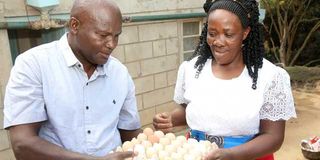Premium
Couple finds grace in kienyeji hens

Harrison Kithuku and his wife Angelina Nduta in Matheka village, Makueni County. The couple started the chicken venture at the peak of the Covid-19 pandemic to keep themselves busy.
About 15 kilometres off the Machakos-Wote highway, the Seeds of Gold team takes the bumpy and dusty road that leads to Kaiti bridge. We drive for about 20 minutes before turning right and climbing the hill to Matheka village.
The moderate temperature here is conducive for sugarcane, avocado and mango production. Some homes have adopted the smallholder mixed crop-livestock systems.
It is here that we meet Harrison Kithuku and his wife Angelina Nduta collecting eggs from the two-storey chicken coop measuring 16 by 14 feet.
“The upper storey has four cubes with a section for layers, chicks, roosters and a quarantine room for the sick birds,” Kithuku says.
The couple rears the Rainbow roosters (improved kienyeji), sisse, indigenous birds and layers, totalling to 96 chickens.
Pandemic
Kithuku, who resides and works in Nairobi, began the project at the peak of the Covid-19 pandemic in 2020. The aim was to keep himself busy.
In addition, he wanted his wife to have an alternative source of income instead of depending on the local chamas and merry-go-rounds.
He sold one of his cows at Sh30,000 and ploughed the amount into poultry farming.
Kithuku used some of the money to build a permanent coop and the rest went into buying 24 chicks from a certified breeder in Nairobi.
According to Kithuku, chicken farming is pocket-friendly, unlike rearing cows, goats, sheep or camels. The birds require little space and their maintenance cost is low.
Kiosks and schools
Nduta, who does the bulk of the work, says the daily routine begins by cleaning the cages every morning.
“This is followed by observing the chickens for any changes in behaviour. I carefully observe the position of the heads, aggression and feather-plucking. One exhibiting such behaviour is immediately separated from the rest of the flock,” she says.
Nduta says chickens are fed on maize flour that is sourced from local posho mills.
About 50 kilogrammes of wheat and omena is mixed and crushed to make 250 kilos of feeds.
The feeds are supplemented with sukuma wiki and other leaves and last for a month.
The birds lay 60 to 65 eggs a day, with Kithuku and Nduta selling one for Sh20.
Most of their buyers are kiosks, learning institutions and fellow Matheka villagers.
“As long as the chickens are well fed, this venture is rewarding. A mature bird sells for Sh1,500 to Sh1,800, depending on size,” Nduta says.
She adds that a farmer needs to watch out for New Castle, a disease that is characterised by sneezing , nasal discharge, twisted neck and diarrhoea.
The disease can wipe out a farmer’s flock in days.
“New Castle is controlled by cleaning and disinfecting the coop, restricting entry of people into the chicken house and reducing contact between the chickens and other birds like turkeys and ducks,” Nduta says.
She adds that for a farmer to reap get maximum benefits from the business, one needs to constantly monitor the flock and take simple courses on poultry farming.
Challenges
The biggest challenge the couple has to deal with is the high cost of feeds. That has made most poultry farmers in Matheka and surrounding villagers quit the venture.
Dennis Kiplel, an animal scientist at Egerton University and director of Kiplels Farm, says poultry is a profitable business that can be split into production of eggs, meat, feeds and hatcheries.
He says environmental extremes like cold and heat can be managed by ensuring the coops are properly ventilated.
Kiplel adds that exposure to environmental stress decreases egg production.
“Smallholder farmers should learn to keep records as this ensures good management practices. That will help the farmer solve many problems,” he says.




